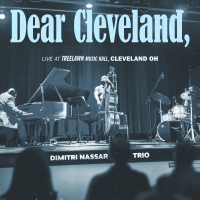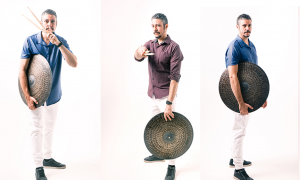Home » Jazz Articles » Interview » A Fireside Chat With Roy Haynes
A Fireside Chat With Roy Haynes
This is my religion. I take long breaks now when I don't perform and I am not myself when I am not performing.
And although much has changed in the world, some things remain constant. Consistency, certainly, something fans of the drummer are familiar with. Not a month after celebrating his seventy-eighth birthday at the Blue Note in New York, Haynes releases his latest studio recording, Love Letters, featuring John Scofield, Josh Redman, Chris McBride, Dave Holland, and Kenny Barron. Yet another consistent recording in a career that is worthy of high praise. Ah, the Royal of Haynes, always smooth, ever as crisp, with a hint of bop, unedited and in his own words.
All About Jazz: What is your secret?
Roy Haynes: I turned seventy-eight in March. The jazz encyclopedia has the wrong year and a lot of publications copy that. But I was born in 1925, March 13, Friday afternoon, two in the afternoon, my mother often told me. She said I was good luck for her [laughing].
strong>AAJ: Tell me about Love Letters.
RH: Oh, Love Letters, how about that? That was done last May. We were in the studio two days. Each group had a day, the group with Scofield and Dave Holland and Dave Kikoski. I think that was the second day. The first day was Christian McBride, Joshua Redman, and Kenny Barron. I really haven't listened to the record that much, but these guys are all great players.
I am in a very unique position here. It may sound like I am bragging, but so many people want to play with me, young and old, it has been and still is a beautiful career. John Scofield and I, I don't think we have been in the studio together and if we have played together at some point, it hasn't been much. He called me up one day and I sent him a copy of the record and he raved about it. One writer here in New York told my son, and this is a very critical guy and I was so surprised, that he loved this record.
So it feels good. I feel a good vibe about this record. It was made for Japanese people. They suggested different artists that I had on there. Joshua was one of mine and naturally, I love Dave Holland and Kikoski had been playing with me for, he says, fifteen years.
That wasn't my idea for the title. I was thinking more Irving Berlin's 'The Best Thing for You.' When we were in the studio, he was going to be a hundred years old around that same period and I always liked his writing. That was the title I was thinking of, The Best Thing for You, but after we decided to do 'Love Letters,' that was from an old movie (Haynes starts singing 'Love Letters'), the Japanese decided to call it that, Love Letters. I want to hear it on the radio. When I hear it on the radio, then I will go crazy [laughing].
AAJ: Having had Kikoski in the band for so long, is it second nature now between the two of you?
RH: I don't know if I want to call it second nature, but maybe, maybe. He has his own projects that he has been doing. Plus, I have a new young band. We don't play together that often anymore, but when we do, our last gig was in Philadelphia. We played opposite the Health brothers with Birds of a Feather. It is almost like it is the first time when we play together. He has really listened to what I have been trying to do all of these years and he knows. I can depend on him for so much, even if I fuck up. Second nature, it could be.
AAJ: Is the Birds of a Feather band still touring?
RH: Well, not really. We did a lot last year. In fact, my account was damn busy, I went to see him again yesterday. We went everywhere. And then these guys, they each have their own projects. Nicholas Payton has won Grammys. Kenny Garrett has a new record out. These guys are busy as hell. I was telling my agent that I didn't want to do too much and they already have gigs for next year with Birds of a Feather. I am not going to do too much. There is a lot of bookkeeping. These guys get tremendous salaries.
I guess I am not answering your question. I do that a lot. I guess I should run for President.
AAJ: It sounds like you are tapering your touring schedule?
RH: We have a few things coming up in California, May 21 and 26. Other than that, I don't plan to do too much more.
AAJ: Having played with a who's who, is there anyone left?
RH: There may be somebody. I never did much with Ornette. I don't know if that would work because he is really not active. My concept has always been that people really have to understand what I am trying to do, those who are on the bandstand with me because everybody can't deal with it or don't want to deal with it. Years ago, when I played with people like Getz and I would make certain record dates, I would play to complement the artist that I was playing with, rather than putting everything that would come to my mind.
These days, I am much older and with my own projects, I do what I want to do, when I want to do. I do anything and evidently that has worked. Evidently, there is a market for it because every place I have played, there may be a young lady who is not familiar with this type of music that will fall in love with it. That is a good sign because people try and say that you can't market this or you can't market that. There is a way that a lot of things can be done, and that is one of the things that has kept me out here this length of time is my concept of the music.
AAJ: I said this last time we spoke, but congratulations again on being awarded the Danish Jazzpar prize. It is a tremendous honor.
RH: Oh, thank you. That is one of the biggest things that happened and was sort of a slap in the face to my dear country here. They gave me some money and the publicity that came from that was so great. I think I told you this, but I was traveling in Europe on a plane with my young band at the time. I think it was Kikoski and probably Ralph Moore, no, Handy. I forget Handy's first name.
AAJ: Craig.
RH: Yes, and a man sitting behind me is reading the paper and he is reading names like Margaret Thatcher and Hemingway and he comes to Boston drummer Roy Haynes. It described that I won this prize. That was a thrill, very big time.
I got another one here in this country that is a big secret, in Washington at the Smithsonian. People had black tie on and it was no big deal. It was nothing. I never heard anything about it. Benny Carter, myself, and a local guitarist that was in a wheelchair, dying of cancer, the three of us got this particular award. It was at the Smithsonian and nobody knew anything about it.
That was some years ago because I remember Benny Carter was going to perform with a big band and after he got through rehearsing. He grabbed me by the arm and we're crossing the street. This guy was eighty then. I said, 'Where do this guy get the fucking energy?' He always wanted to play with me. He said, 'When are we going to play together?' He said it that day.
It is great. This is my religion. I take long breaks now when I don't perform and I am not myself when I am not performing.
AAJ: How do the hours pass?
RH: I have three children and five or six grandchildren. I have a lot of friends. I have automobiles, several. I have a house in Vegas that I have had for about a year and a half. I go there and just hang out. The weather is nice. Sometimes, it gets too damn hot. I had a little money invested and took it out just before 9/11 for that purpose, to buy a house, cash. I have a couple of houses here. In fact, today in an hour or so, somebody is coming to walk through this house. It is in contract. I was supposed to have a closing tomorrow on this house that I have lived in for twenty-three years.
I am always busy with a lot of stuff. I used to have dogs until I started going on the road a lot. I liked building things. Even as a kid, I was always building cars. I like building things around the house and in the backyard. How does the song go, 'I've had a few.' What's the line before that?
AAJ: Regrets.
RH: Regrets, exactly. I have my regrets. As they say, 'Keep on trucking.'
Tags
PREVIOUS / NEXT
Support All About Jazz
 All About Jazz has been a pillar of jazz since 1995, championing it as an art form and, more importantly, supporting the musicians who make it. Our enduring commitment has made "AAJ" one of the most culturally important websites of its kind, read by hundreds of thousands of fans, musicians and industry figures every month.
All About Jazz has been a pillar of jazz since 1995, championing it as an art form and, more importantly, supporting the musicians who make it. Our enduring commitment has made "AAJ" one of the most culturally important websites of its kind, read by hundreds of thousands of fans, musicians and industry figures every month.






















